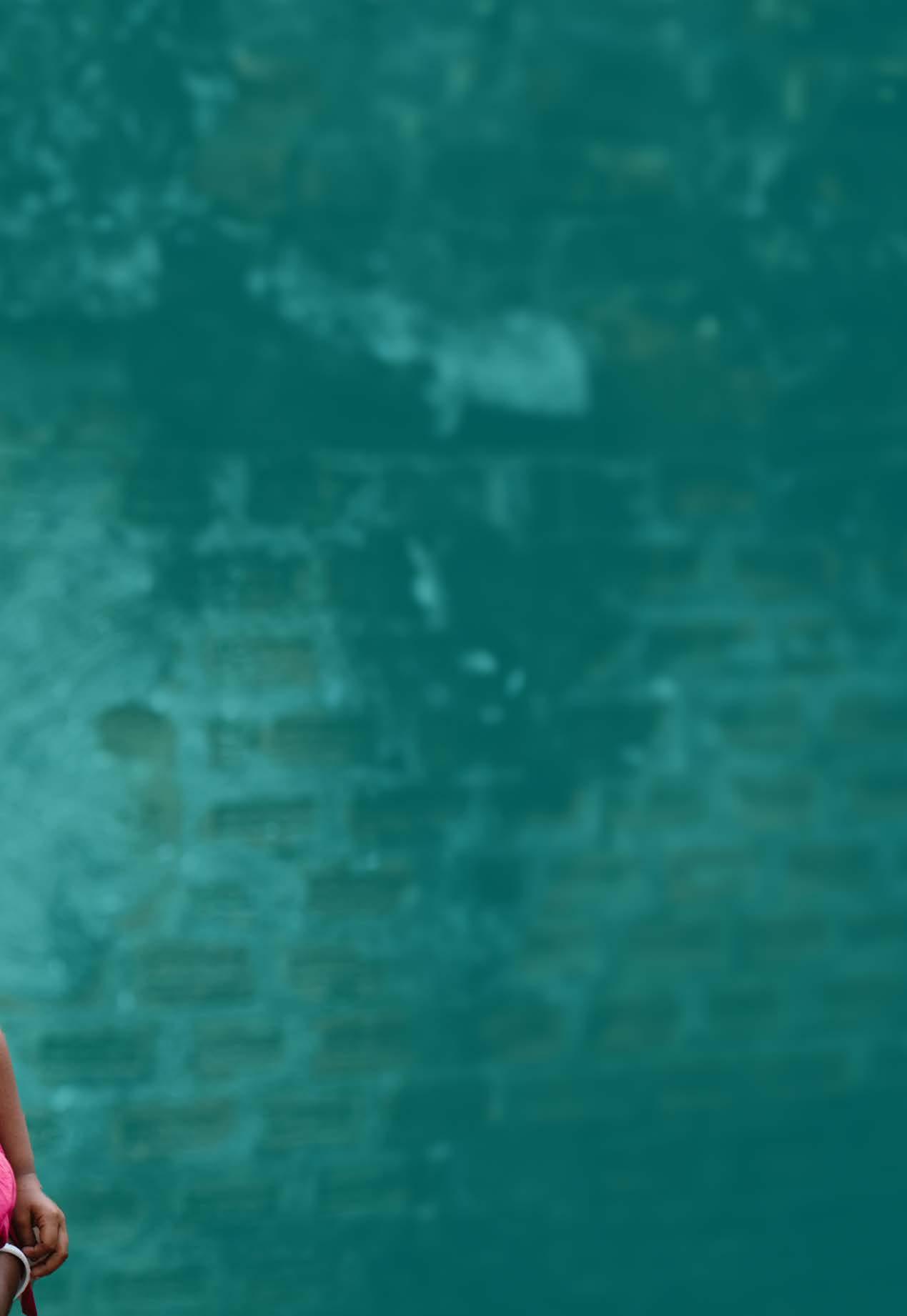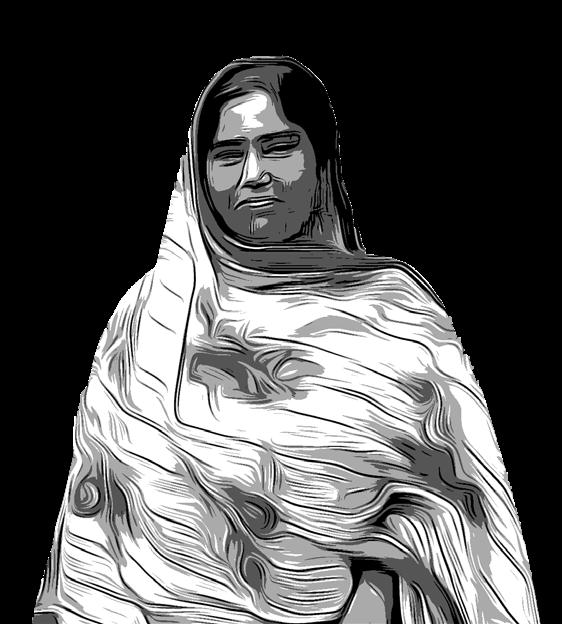




















It has been a wonderful Centenary year for Lepra far, punctuated by some great events and activities to mark this important milestone
Throughout 2024, we have been reflecting and celebrating our long and rich history at the forefront of care, treatment and support for thousands upon thousands of people across the world affected by leprosy and lymphatic filariasis (LF).

We take pride in Lepra’s heritage, but we are also acutely aware of how much more needs to be done. Leprosy still exists. still exists. Millions of people still live with the lifelong impact of both.
So, as we look back over our one hundred years, 2024 is also a time for us to take stock of where we are going as well as where we have come from.
We are determined to build on the successes of the past, and further our work in the years ahead. We know we have more to give to
support people affected by leprosy and LF in the world.
Over the past months, we have been planning for the future and are delighted to have developed our new six-year strategy for 2024-2030. health, inclusion and innovation for people affected by leprosy and focus builds on what we already do well. We have a long track record in healthcare service provision for people affected by leprosy and LF and it will continue to be a cornerstone of our inclusion focus accelerates our work on addressing stigma and discrimination, as well as supporting empowerment, quality of life and wellbeing for people affected by leprosy and LF – placing them at the forefront, and amplifying their voice and agency to realise full inclusion and equality in society.







innovation focus enables us to test and trial new ways of caring, treating and supporting people affected by leprosy and LF. There has been so much progress in care and treatment for people affected by leprosy and LF over the past decades, but more needs to be done to support the millions of people still affected.

Our new strategy brings us back to our origins, reconnecting us with our past, and our proud history of research and innovating for better care and treatment.
Our new Global Strategy will ensure that we stay true to Lepra’s roots and heritage. We will always place the needs of people affected by leprosy and LF at the forefront of all that we do – as we have always done.
And as we acknowledge our one hundred years of impact, our Global Strategy helps us to look ahead with clarity of purpose, and keep working towards a world where leprosy is a disease of little consequence, and we are no longer needed. keep working towards a world where we are needed no more


The ‘New Face for Leprosy’ exhibition will visit Coventry Cathedral in September and Wells Cathedral in December.
The thought-provoking images from photographer Tom Bradley, feature alongside interviews by leading leprologist Professor Diana Lockwood, collected when they travelled to Lepra’s projects in Bangladesh.
The exhibition challenges the myth and perception of leprosy by showing people affected by leprosy experiencing normal life, working and having a family. The exhibition encourages people to see past the disease.

Coventry Cathedral 27 - 29 September 2024

Wells Cathedral 13 - 16 December 2024
Please visit our events webpage to find out more register your interest
www.lepra.org.uk/events



On Sunday 8 September 2024, Lepra Ambassador and best-selling author Victoria Hislop 2024 BBC Radio 4 Appeal.
Following our last Radio 4 appeal in 2017, we are thrilled that Victoria has agreed to offer her support once again.
As the author of the award-winning novel ‘The Island’ and the incredibly touching children’s book ‘Maria’s Island’, Victoria’s unwavering dedication to this cause has helped keep the emotional and social impact of leprosy, firmly in the public consciousness.
Victoria became an Ambassador in 2013, following a visit to see Lepra’s work in India, while researching ‘The Island’:
“I met hundreds of people whose lives had been transformed, through education and treatment and every person I met was unique.


person-centred approach supported people with different needs and circumstances, whether it’s multidrug therapy, protective footwear, a community loan to earn a living, a sight-saving operation or teaching how to care for their hands and feet. The whole person is cared for in a practical and, perhaps most importantly, dignified way”.

The Island follows the story of Alexis Fielding who, on the brink of a life-changing decision, longs to find out about her mother’s secret past in Crete. When Alexis decides to visit the country, her mother gives her a letter to take to an old friend, and promises that through her she will learn more.
Her journey brings her to the Island of Spinalonga, where she discovers how intimately she is connected with the island, and how secrecy holds them all in its powerful grip.




www.bbc.co.uk/charityappeals/appeals/radio-4-appeal



For this year’s appeal, Victoria describes the inspirational real-life story of Maksuda, a young mother from a small village called Pachimpara, near to the town of Sirajganj, Bangladesh.
Despite receiving an early diagnosis and having access to free and effective treatment, Maksuda’s life was torn apart. She faced divorce, social isolation and was left with no income and a young daughter to support.
Victoria explains that with Lepra’s support, Maksuda was able to access a

local self-support group, which played a vital role in her physical, social and financial recovery.
To find out more about our 2024 BBC Radio 4 appeal and to hear Maksuda speak about her role in creating a regional ‘Federation of People Affected’, please scan the QR code to visit our appeal page.

A children’s novel, Maria’s Island is an absorbing story of the Cretan village of Plaka and the tiny, deserted island of Spinalonga told to us by Maria Petrakis, one of the children in the The Island.
Maria tells us of the ancient and misunderstood disease of leprosy, exploring the themes of prejudice, shame and the treatment of those who are different.
Find out more at www.victoriahislop.com



has been an important year for our programmes team in the UK, India and Bangladesh, as the organisation works to lay the foundations for the delivery of our new six-year Global Strategy.
In late 2023, we were invited to present to the WHO Technical Advisory Group about concerns regarding the suitability of multidrug therapy (MDT) in children under 10 years old. Through working in partnership with ILEP (an alliance of leprosy NGOs), we hope our collective voice will result in better dosing guidance for treating children and with formulations which are better suited for them.
We have also been focusing on improving our existing programme of activities by developing staff capacity in areas we identified as in need of strengthening.
From improvements in our processes and procedures, through to the introduction of new reporting and evaluations templates, we have provided comprehensive support and oneto-one coaching for state coordinators and programme managers to help implement the improvements we are making in preparation for the launch of our new strategy.


In 2023-2024 3,895 new cases of leprosy were detected, underscoring the vital role of early diagnosis and intervention.
This was achieved through widespread awareness campaigns, with over 25,000 active participants, helping to raise awareness of neglected tropical diseases (NTDs).
We continue to focus on disability prevention by distributing 11,259 pairs of footwear and training 25,406 people in self-care techniques, empowering them to manage their health more effectively.
We also increased accessibility to care by expanding healthcare infrastructure through the establishment of eight new satellite centres. To ensure the sustainability of these centres we trained
In 2023-2024, Lepra Bangladesh implemented four key projects addressing the mental and physical health, socio-economic conditions, and rights of those affected by leprosy and LF.
The “Proyash” project strengthened the government health system’s capacity to provide essential care for leprosy, including difficult diagnoses, referrals, self-care guidance and mental health support.
Over 2,100 pairs of footwear were also distributed to patients. Additionally, government data collection and policymaking capabilities were improved.
The Disability Initiative for Independent Living Project organised 2,080 people affected by lymphatic filariasis into
over 5,500 government healthcare staff members in prevention, treatment, and complication management, helping to strengthen the national health system.
Our advocacy work successfully achieved the construction of accessible toilets and proposals for collaboration with the Indian Association of Leprosy Doctors in Andhra Pradesh, while in Odisha, we were able to secure the reopening of dormant health units as well as the establishment of new ones, and also succeeded in leprosy being classified as a reportable disease
Across all regions, new partnerships have been established, to deliver resource mobilisation, in-kind donations, and livelihood support.
self-support groups, enhancing their leadership skills and self-care practices, resulting in reduced acute attacks and fungal infections.
The Mind to Heart project focused on mental health, providing self-care training and peer counselling, which significantly improved the wellbeing of participants.
Lastly, the UPLIFT project organised affected individuals into community based groups, fostering sustainability through increased participation and access to social support schemes.
Collaboration with the government and other stakeholders was crucial to these achievements and we will be continuing to strengthen our collaboration and partnership in the coming year.




India
2023-2024
West Delhi Referral Centre
Holistic care and treatment centre
St Joseph Leprosy Centre
Holistic care and treatment centre
SAMARTH
Mental and social health research project
Blue Peter
Public Health and Research Centre
Level 3 research centre and laboratory
NTDRU
NLEP Data Streamlining Project
Data quality and coordination
UPLIFT
Community psychosocial and mental health project
iNTDRU - Neglected Tropical Disease Resource Unit


Active case finding, holistic care, facilitation of complex care, training and advocacy
TATA SPARSH Project
Active case finding, holistic care, facilitation of complex care, training and advocacy
SoneLep
Comprehensive Care Centre
Detection, holistic care, treatment, advocacy and health system strengthening Koraput Referral Centre Holistic care and treatment centre
Swabhiman 2.0 Project
Active case finding, holistic care, facilitation of complex care, training and advocacy
NTDRU
NTDRUs are regional hubs which coordinate and support a network of referral centers and projects, which provide services such as: Active Case Finding (ACF) physiotherapy, surgeries, counselling, footwear units and outreach activities.
Lepra works in ten states of India including Bihar, Jharkhand, Delhi, Maharashtra, Madhya Pradesh, Odisha, Chhattisgarh, Andhara Pradesh, Telangana and Delhi, some of which are the most populous and most endemic states in the country.



We focus our work in some of the most endemic areas of India and Bangladesh, working with local communities, regional healthcare service and government, to provide specialist care to the people with the greatest need.

DIIL Project
Disability Initiative for Independent Living
Bangladesh 2023-2024

Proyash Health systems strengthening project
Mind to Heart Mental wellbeing project
UPLIFT
Unlocking the Potential of leprosy & NTD affected people
Barguna LF Integrated Project (BLIMP) Morbidity Management and Disability prevention
Bangladesh has a land area similar to England and Wales but holds three times the population. This high population density contributes to healthcare access inequalities.
www.lepra.org.uk/what-we-do



Finding leprosy and lymphatic filariasis (LF) cases early, is paramount in preventing disability, reducing the impact on mental health and fostering good wellbeing for people affected.
Early detection of leprosy and LF is one of the cornerstones of Lepra’s work. It’s not a new concept by any means; we have been striving for better ways to detect and diagnose cases for years. But it is an important concept, and one which we are going to dedicate more time, resources and attention to in the coming years.
Traditionally, a new case of leprosy or LF is only diagnosed when someone presents themselves at a health centre. Maybe they are worried about their emerging signs and symptoms. Maybe they have been encouraged by a family member or friend to go and get checked. Whatever the reason, it relies on people taking a decision to go to the clinic themselves, with no direct role of the health care system.

We call this ‘passive case detection’: diagnosis without direct intervention.
But there are many barriers to someone deciding to go to the clinic to get checked out.
It may be a long way away, so you have to organise transport, which comes at a cost when maybe you can’t afford to, and even if you could, maybe you had more pressing things that you needed to buy. Or maybe you don’t have the time
Or maybe you don’t have faith in the service you would get if you did go. Or maybe you’re not even that concerned – your symptoms are only minor and don’t affect your day-to-day life. Or maybe you want to keep your potential diagnosis a secret or simply aren’t ready to accept the truth.





Maybe your position in your family – your age or your gender – means you don’t have the freedom or independence to go.
Any of these barriers could delay your decision to seek health advice. And this could be critical, for as we know, the earlier you detect and treat a case of leprosy or LF, the better the health outcomes and the more likely you can minimise the lifelong impact. Often, by the time even the earliest signs of infection become apparent, lifelong disability and discrimination are already factors.

This is where ‘active case finding’ comes in. Instead of waiting for someone to decide to come to you, you go to them. Lepra teams in India and Bangladesh do this through community outreach – going village to village, door-to-door and person-to-person. It is a time-consuming approach, but we know highly effective.
in the district, reaching 86% of all households. The result was more than three times the usual number of leprosy and LF cases being diagnosed. It is an impressive and important achievement.

Most importantly, the ASPIRE approach reaches the hidden cases, the people who would otherwise go undiagnosed. The people for whom the barriers to go to a clinic themselves prove too much: children, the elderly, the economically, socially, culturally and geographically marginalised - The people who need support the most. Active case finding reaches them and enables them to get the support they need.
In Jamui District in Bihar State, India, the ASPIRE project takes this exact approach.
Working with the government health system, the project visited and screened every single village
So, at Lepra, we are looking to scale up our work on the ASPIRE project in the coming years, taking the approach to other districts and communities.
We see it as a much-needed and highimpact approach – an opportunity to reach the people who otherwise do not get the care and support which is so vitally needed.


Over the course of the project we have so far:
Screened over 2 million people in 350,000 households
Detected and treated 10,500 new cases of leprosy, LF and scabies


We are extremely thankful for the generous support we receive from charitable trusts and foundations that allows us to fund new and ongoing projects providing life-changing services in India and Bangladesh...
Donating can be a hugely personal decision so we work closely with each funder to ensure that they can engage with our work in the way that suits them best.
We provide regular updates on the impact of their giving, opportunities to engage further with our teams and to visit our in-country projects, alongside invitations to our events.
Many of the trusts and foundations associated with Lepra have supported us over many years – some dating back to the 1980s and 1990s. We have a close relationship with them and
are always inspired by their reasons for supporting our work.
In this issue of Lepra News, we would like to celebrate the amazing contribution of the late David Seal, founder of The Gengulphus Fund.
We first received an anonymous donation from the fund in July 2007 and have since received over 200 very generous donations.
In 2012, 47-year-old Bizly Rani developed white patches all over her body and at first thought they were due to an allergic reaction.
It was whilst she was accompanying her husband to a healthcare appointment that staff noticed the white patches and suspected leprosy.
When a doctor first told Bizly she had leprosy, she was frightened but he reassured her that the disease was curable. After a 12-month course of multidrug therapy (MDT), the white patches began to disappear, and her skin sensation improved. Bizly had also developed a foot ulcer but by
following Lepra’s self-care techniques and wearing specialist protective footwear, her injury improved.
Bizly joined a self-support group and is now a Community Champion, helping to detect over 65 new cases! She travels door-to-door finding people with symptoms and encourages them to seek the right treatment.


Whilst Bizly’s neighbours found it difficult to understand and accept her diagnosis, she has been grateful to have the ongoing support of family.
Read more about the lives you have helped transform:





David remained unknown to Lepra until after his sad sudden death at the age of 65 in 2021.
David’s siblings decided to continue his charitable support of Lepra and we have since learnt of his inspirational history.
After achieving a mathematics degree at Cambridge University, he began work at ‘Acorn Computers’ in the 1980s before joining with 11 Acorn engineers to found ‘Arm’ in November 1990.
With David’s input, the firm developed processor technology that is now used by more than 70% of the world’s population!
David’s family kindly allowed us to view his memorial page and we can see from the comments that he was an exceptionally kind-hearted and
inspirational character who is greatly missed.
His sister, Rosemary, told us that David was very private about his charitable donations but knows that he chose to give to Lepra as he believed the funds would be used effectively to make a real difference to the lives of people affected by leprosy.
We are truly grateful for David and his family’s support of our work.
If you are a member of a trust or foundation and would like to know more about our work, we would be delighted to hear from you.
Please contact Angela Stafford - Trusts and Foundations Fundraiser
e: AngelaS@lepra.org.uk t: 07598 483234



We recently interviewed fundraiser, teacher and all-round legend Mr David Gratton, Head of Sixth Form at Egglescliffe School who has supported Lepra for over 30 years
David Gratton first began working at Egglescliffe School in Stocktonon-Tees 36 years ago.
“My predecessor was a keen supporter of Lepra, and I recall an assembly given by a powerful speaker from the charity. It was quite hard-hitting in terms of the disease and its impact and how we could help.
That was a powerful message that the students held on to, and I did as well. Contrary to what the national media say, young people are still lovely, they still care, they still want to do the right thing.
In those days, we used to take part in street collections but as time went on, that was less appropriate. I came up with the idea of having a workout and the students just ran with it, coming up with their own ideas for fancy dress.
It progressed from a physical workout to a dance session. The fact that it is lighthearted relief in the schedule is what students like the best”.
A new sixth form block was opened in 2019 by former American astronaut Buzz Aldrin’s son, Aldrin and so it was fitting to have a space-themed activity for that year. David fondly remembers he and other staff dressing as space explorers:
“I am a bit of a space nut; we have a plaque commemorating Andrew Aldrin, and each of our blocks is named with a space theme.


Other fancy-dress themes have included jockeys, Minions, nuns, and penguins!







Once we had a student whose parents worked at the local hospital and the staff there got involved, we raised
David sees fundraising in schools as a
You need a good team behind you because you can’t quite pull it off on your own. I have been known to wear fancy dress; I don’t mind making a fool of myself, but I need more than just me to do it. You need all the tutors on board to push the message through at registration times.
You need plenty of time. You need to have assemblies in advance, get students’ heads around the idea, keep pushing, keep reminding, and keep promoting through social
How fundraising can have a profound
“It’s time out from a very busy and sometimes quite serious schedule. It gives them an outlet and allows them to see stuff in another light which builds relationships and a sense of
community. It can make students think about more than themselves. It gives them a potential ambassadorial role in the future because I know former students talk with fondness about the Lepra workouts.”
As David approaches retirement, we want to express our sincere thanks to him and Egglescliffe School staff and students for their extraordinary fundraising efforts!
“I can’t recommend fundraising for Lepra highly enough to schools and teachers elsewhere. Please get involved. It’s just something different that the staff particularly look forward to”.
If your school is interested in supporting Lepra and helping us to raise awareness of this important cause, please scan the QR code to find out more:




On Sunday 8 September 2024, Lepra Ambassador and best-selling author Victoria Hislop led our 2024 BBC Radio 4 Appeal! Listen online: www.bbc.co.uk/charityappeals/appeals/radio-4-appeal


£15 is the total cost for a slit skin smear kit that can diagnose 50 people within an affected community. Active Case Finding is helping us to significantly reduce the impact of leprosy.



£50 can fund a Community Champion like Maksuda to deliver vital support to their local community for two entire months. Helping to improve health and wellbeing outcomes for years to come.
£120 provides ulcer care for up to 12 people. This vital care eases pain, prevents further infections, and stops complications from worsening. This enables people to recover quickly and return to their daily lives.
Help people and their families affected by leprosy and LF receive the right care, at the right time and in the right place.
Help keep our administration costs low. 1 2 3 4 5


Help us plan future projects in the areas which need it most.
Spread your giving across the year, and change or stop payments at any time.
Stay informed through regular newsletters and progress updates.














